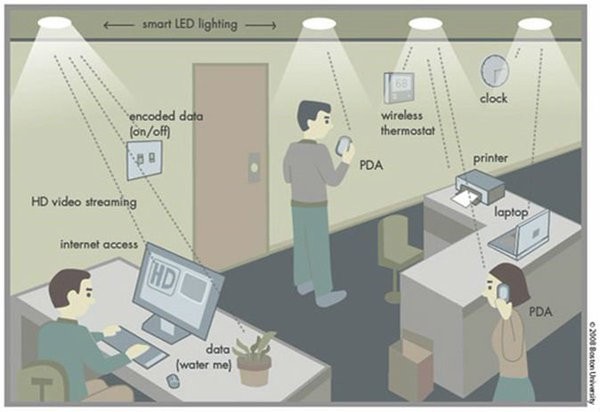A new technology called Li-Fi is expected to revolutionize wireless communications, offering data speeds up 100 times faster than current WI-fi technology that can be sent from a regular lightbulb.
Short for Light Fidelity", Li-Fi uses light to transmit information, as opposed to radio waves for Wi-Fi. This allows for faster speeds of up to 1 Gbps (gigabits per second0, as well as being able to support more devices in a network, Digital Journal reported.
The technology is based around the "visible light communications" protocol developed by University of Edinburgh professor Harold Haas in 2010. it revolves around the concept of using the flickering of LED bulbs to carry binary code, with one's represented by the light on and zeroes represented by the light off.
While Li-Fi was initially an experimental technology, Estonian start-up company Velmenni said that they are set to bring it to commercial use. "We're now carrying out a few pilot jobs within different companies where we can employ the VLC technology," Velmenni CEO Deepak Solanki said.
In a 2011 TED Talk presentation, Haas said that when realized, the technology could use ordinary household LED bulbs could be used as Li-Fi transmitters. As the system works in the 400 and 800 terahertz (THz) bands, the flickering would not be noticeable and will not affect the bulb's use for illumination.
However, experts were quick to dispel the notion that Li-Fi is set to supersede Wi-fi in the near future, citing its limitations. They pointed out that Li-Fi can only be used in enclosed rooms, as intense illumination like sunlight and nightlights will disrupt the signal.
Also, as light is not able to pass through walls, use will be limited to only a particular room, unless the bulbs in other rooms are fitted as routers. But, some see this as a security advantage in a corporate environment, as outsiders will not be able to access it, unlike an exposed WI-fi network
Experts said that it would better to think of Li-Fi as an "alternative" means of connection, with devices seen as being able to switch between it, WI-fi, and mobile data as the situation demands, Tech Crunch reported.



























